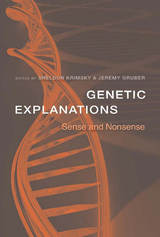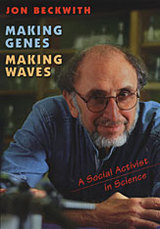
Can genes determine which fifty-year-old will succumb to Alzheimer’s, which citizen will turn out on voting day, and which child will be marked for a life of crime? Yes, according to the Internet, a few scientific studies, and some in the biotechnology industry who should know better. Sheldon Krimsky and Jeremy Gruber gather a team of genetic experts to argue that treating genes as the holy grail of our physical being is a patently unscientific endeavor. Genetic Explanations urges us to replace our faith in genetic determinism with scientific knowledge about how DNA actually contributes to human development.
The concept of the gene has been steadily revised since Watson and Crick discovered the structure of the DNA molecule in 1953. No longer viewed by scientists as the cell’s fixed set of master molecules, genes and DNA are seen as a dynamic script that is ad-libbed at each stage of development. Rather than an autonomous predictor of disease, the DNA we inherit interacts continuously with the environment and functions differently as we age. What our parents hand down to us is just the beginning. Emphasizing relatively new understandings of genetic plasticity and epigenetic inheritance, the authors put into a broad developmental context the role genes are known to play in disease, behavior, evolution, and cognition.
Rather than dismissing genetic reductionism out of hand, Krimsky and Gruber ask why it persists despite opposing scientific evidence, how it influences attitudes about human behavior, and how it figures in the politics of research funding.

In 1969, Jon Beckwith and his colleagues succeeded in isolating a gene from the chromosome of a living organism. Announcing this startling achievement at a press conference, Beckwith took the opportunity to issue a public warning about the dangers of genetic engineering. Jon Beckwith's book, the story of a scientific life on the front line, traces one remarkable man's dual commitment to scientific research and social responsibility over the course of a career spanning most of the postwar history of genetics and molecular biology.
A thoroughly engrossing memoir that recounts Beckwith's halting steps toward scientific triumphs--among them, the discovery of the genetic element that turns genes on--as well as his emergence as a world-class political activist, Making Genes, Making Waves is also a compelling history of the major controversies in genetics over the last thirty years. Presenting the science in easily understandable terms, Beckwith describes the dramatic changes that transformed biology between the late 1950s and our day, the growth of the radical science movement in the 1970s, and the personalities involved throughout. He brings to light the differing styles of scientists as well as the different ways in which science is presented within the scientific community and to the public at large. Ranging from the travails of Robert Oppenheimer and the atomic bomb to the Human Genome Project and recent "Science Wars," Beckwith's book provides a sweeping view of science and its social context in the latter half of the twentieth century.
READERS
Browse our collection.
PUBLISHERS
See BiblioVault's publisher services.
STUDENT SERVICES
Files for college accessibility offices.
UChicago Accessibility Resources
home | accessibility | search | about | contact us
BiblioVault ® 2001 - 2024
The University of Chicago Press









